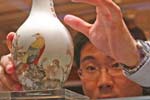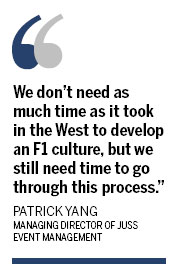Business
F1 sponsors expect lucrative returns
Updated: 2011-04-11 11:12
By Matt Hodges (China Daily)
"F1 broadcasts China to the world, linking it to technology, sport and glamour, while showcasing the city of Shanghai," said Reid. "This is why countries around the world are willing to pay high fees to the Formula One Group to host races, in the case of China an estimated $40.3 million."
"Sponsors can gain significant returns through buying branding on the cars compared to spending the equivalent sum on TV advertising," she said. "We estimate that in 2010, Vodafone, for example, paid $65 million to McLaren as its title sponsor, but gained TV exposure which would have been worth $122.5 million if it had bought it as traditional TV advertising spots.
"This is an extremely significant return, and at last year's Chinese Grand Prix, F1's team owners, sponsors and trackside advertisers gained exposure worth $87.7 million."
|
|
To add some perspective, the average value of an F1 sponsorship last year was $5.2 million, down from $7.2 million in 2008. The biggest team title sponsors pay as much $100 million a season.
The global credit crunch has played a hand in reshaping the landscape of F1 sponsors. A number of prominent banks, such as Credit Suisse and ING, declined to extend their sponsorship contracts, while fashion labels like Hublot, Henri Lloyd and Savile Row tailors Gieves & Hawkes are now making their presence felt.
The Financial Times reported on this last year as indicating a changing of the guard in terms of F1 sponsors, away from Big Tobacco and toward consumer, technology and high-fashion brands.
Cue Hublot's touchdown at the $450-million Shanghai International Circuit last year, when the watchmaker set up a boutique at the exclusive Paddock Club to wine and dine business contacts. This is considered especially important in China, where building guanxi, or strong relationships, makes all the difference between success and failure in the business world.
"For the time being, our penetration in China is still weak. How could it be different after only one year?" said Biver. "But considering the short time, I must admit that China is a fast-growing market for us at the moment, and our penetration is extraordinarily rapid and strong." Hublot entered China in 2009 and derives around 1 percent of its revenue from the country.
Biver is not the only one buying into the China F1 dream, despite a series of setbacks that have hit the sport, and the race, over the last five years. These include the impact of the global recession, which saw three major F1 players, Honda, Toyota and BMW, pack up and leave in 2008 and 2009; into the vacuum slipped Asian-backed teams like Lotus, run by Air Asia boss Tony Fernandes of Malaysia, and Force India.
F1 began officially recognizing commercial sponsorship in 1968, 18 years after the sport's inaugural season. During the 1960s, sponsorship liveries overtook team colors to build races contested by what, at times, looked like giant speeding cigarette packets. Then things started to get really expensive.
This investment-guzzling trend hit a new bump in the road in 2009, when sponsorship revenue dropped 8 percent from the previous year. This spelt bad news for teams, which typically rely on sponsors for 80-85 percent of their revenue, but not for the Formula One Group, which still rakes in about $1.3 billion a year from fees, trackside advertising and the ever-so-important TV rights.
Scandals formed another annoying blip on the China radar in 2008, when Yu Zhifei, the man credited with bringing F1 to China, was jailed for four years as part of a huge crackdown on graft. As a sign that Asia's reputation for clean and transparent management still needs some work, South Korea fired Chung Young-cho, the chief organizer of that country's race, for lax management.
However, none of this seems to have registered much with sponsors hungry to gobble up more of the Chinese, or Asian, market.
Swiss bank UBS signed up last summer as F1's fourth global sponsor, alongside German insurer Allianz and German logistics giant DHL, and South Korea's LG. The deal gives UBS the right to act as title sponsor of the China Grand Prix, a title first held by Sinopec, China's largest oil company.
UBS, which also sponsors the annual Beijing Music Festival in October, sees F1 as a crucial stepping-stone for brand building and making its Chinese clients feel important.
Specials

Share your China stories!
Foreign readers are invited to share your China stories.

Art auctions
China accounted for 33% of global fine art sales.

Waiting for drivers' seat
Lack of sponsorship appears to be why Chinese drivers have yet to race in a Formula 1 event
